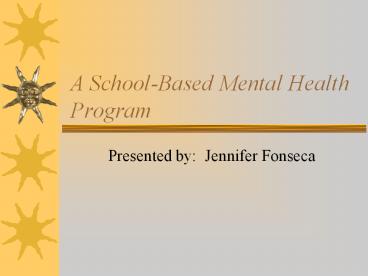A School-Based Mental Health Program - PowerPoint PPT Presentation
1 / 18
Title:
A School-Based Mental Health Program
Description:
A School-Based Mental Health Program Presented by: Jennifer Fonseca Purpose To evaluate the availability and the needs of a school-based mental health program in two ... – PowerPoint PPT presentation
Number of Views:475
Avg rating:3.0/5.0
Title: A School-Based Mental Health Program
1
A School-Based Mental Health Program
- Presented by Jennifer Fonseca
2
Purpose
- To evaluate the availability and the needs of a
school-based mental health program in two
inner-city Chicago schools.
3
Research Question
- What are the availabilities and the needs of a
school-based mental health program as perceived
by the school mental health center staff?
4
Setting
- Two Urban Elementary Schools
- -Henry Suder Elementary School
- -Smyth Joyner Elementary School
- Both located on the Near West Side of Chicago
- Each surrounded by public housing
- -Henry Horner Housing Development
- -ABLA Public Housing
5
ABLA Public Housing(Addams, Brooks, Loomis, and
Abbott)
6
The Henry Horner Homes on the Near West Side of
Chicago
7
Participants
- Henry Suder Elementary School Staff
- Smyth Joyner Elementary School Staff
- University of Illinois at Chicago Staff
8
What is the STARS program?
- Student Therapeutic Activities and Resources
Services (STARS) - Helps child talk about fears, worries, and issues
that might be causing trouble in school, getting
along with others, and following rules
9
Available Services Provided by the STARS Program
- Individual student counseling
- Class room observations
- Individual talk sessions
- Family counseling
- Guidance counseling
- Play Therapy
- Anger Management
- Stress Management
10
Methodology
- A survey tool was used to guide a face-to-face
interview with 10 staff members from the mental
health program - Open-ended and close-ended questions were
organized - Data was analyzed by using simple descriptive
statistics
11
Assumptions
- Faculty and staff are very familiar with the
STARS program - Faculty and staff have had children who have
shown behavioral problems in their classrooms
12
Limitations
- Most of the faculty and staff at the schools are
off during summer - Some faculty only taught during the summer and
were not very familiar with the program - The mental health program (STARS) is fairly new
13
Results
- Time mental health program has been in schools
- - 2 years
- Contributing factors causing children to show
behavioral problems in classroom - -Limited Community
-Excessive Television - Resources (70)
Watching (90) - -Lack of Parental
-Genetics (50) - Supervision (100)
-Exposure to Neighborhood - -Poor Nutrition (70)
Violence (90) - -Other (50)
14
Results (contd)
- Behavioral concerns of children in the classroom
- -Difficulty Sustaining
-Leaves seat in classroom when
- Tasks (90)
told not to (70) - -Does not seem to listen
-Talks excessively (70) - when spoken to (50)
-Blurts out answers (80) - -Does not follow
-Other (20) - instructions (60)
- Average amount of teachers who have had a child
or children participate in the program at these
schools - - 70
15
Results (contd)
- Behavioral changes in children who have
participated in the program - -Great Improvement Overall ( 70)
- -Others did not answer
- As perceived by faculty, were students meeting
their needs through the program? - -Yes ( 70)
- -Others were not applicable
16
Results (contd)
- Needs for the Program
- -More students need to participate in the
program but have limitations such as no insurance - -More interaction with parents, teachers,
and health service officials - -Some students need to be seen more often
17
Discussion
- Faculty members agree that the STARS mental
health program in both schools has shown positive
impact on children in need - Plans for expanding program into other urban
schools in underserved communities
18
Acknowledgements
- Dr. Cynthia Barnes-Boyd
- Mentor
- Dr. Barbara Preib-Lannon
- Facilitator of STARS
- program
- SROP Staff































